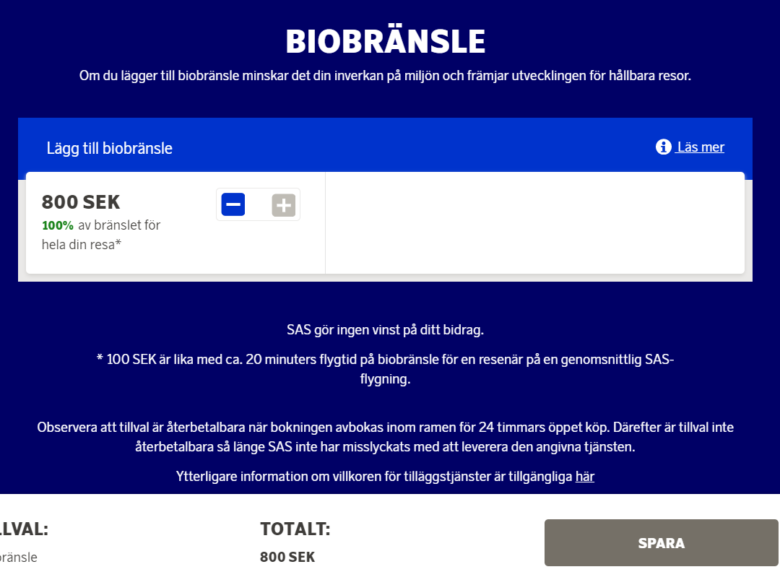I must regrettably announce that, despite my best intentions not to, I will be flying this year. I had initially planned to take the train through Europe to Oxford, but alas, the virus thought otherwise. But given the negative impact that flying has on the environment, what should one reasonably pay for a flight in 2020?
Fortunately for me, however, the Swedish airline company SAS are doing a lot to alleviate their customers’ (so-called) “flight guilt” (flygskam). Not only does SAS provide “climate compensation” (carbon offsetting) for all SAS Youth tickets they sell, but they also provide the option to pay extra to increase the purchase of biofuels for flights.
So what does it cost to make my flight “biofueled”? SAS tells me that every 20 minutes of flying costs around 100 SEK to fly using biofuels (or so they imply). They ensured that no profit was made from this additional fee and that it is produced in a manner that does not crowd out food production nor undermine water supplies, biodiversity, or land.
What was most striking to me was that the cost of the flight itself was just 427 SEK (~$50) while taxes/services summed up to 352 SEK. So a total of 729 SEK is pretty cheap for a 2 hours 40 minutes flight. Adding the 800 SEK of biofuel add-on and my total ticket price summed up to 1579 SEK (~$170).
But what is reasonable to pay for a flight? Let’s try to figure out if this flight indeed was expensive based on a more objective measure (as opposed to some arbitrary norm based on what flight tickets have cost). One such way is to calculate the “social cost of carbon dioxide” (SCC).
The SCC is based on the idea that the use of fossil fuels imposes a cost on other people and on future generations. So, let’s say that my trip to Heathrow gives me value that, in monetary terms, sums up to $300. If the costs to all currently living and future generations of people exceed the value I derived from this flight, then me taking this flight is “uneconomical” (it’s a net-loss in benefit, calculated in dollars).
What is the estimated SCC right now? Nobel laureate William Nordhaus’ DICE model (despite its many weaknesses) would tell us that one additional ton of carbon dioxide constitutes a cost of around $36. Two Swedish researchers recently estimated the total CO2 equivalent (CO2eq) climate effects of per kilometre travelled by air to be 170 grams CO2eq. The distance between Stockholm and London is 1433 km. This puts the estimated “climate cost” of a flight from Stockholm to London at $8.77.
What conclusion can we draw from this? Firstly, that the Swedish tax for flights within the EU currently at 62 SEK ($7.18) is by and large in line with the mainstream scientific view. Secondly, I should probably do the calculations on how I can best help the climate before I decide to add the “biofuel option” next time. However, I would like to note that I will revisit this issue and discuss some of the (quite ridiculous) assumptions that underpin the above mentioned $36 SCC estimate.
Sources:
The social cost of carbon: https://www.carbonbrief.org/qa-social-cost-carbon
Nordhaus/DICE $36 SCC: https://www.pnas.org/content/114/7/1518
Carbon per km flying: https://research.chalmers.se/publication/508693/file/508693_Fulltext.pdf



